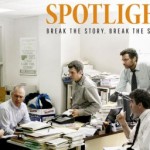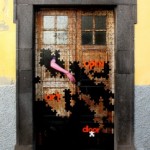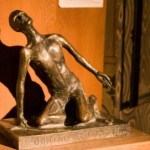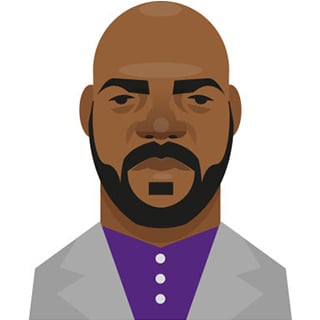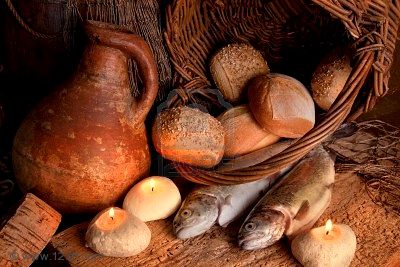 In a dream, the Prophet Ezekiel ate a Torah scroll, to show how sweet as honey was the word of God (3: 1-3)
In a dream, the Prophet Ezekiel ate a Torah scroll, to show how sweet as honey was the word of God (3: 1-3)
Perhaps also in a dream, the prophet Elisha saw his teacher Elijah lifted into heaven in a chariot , and he begged him, leave me a double portion of your spirit, and Elijah threw him his mantle (his spiritual power) that day, because his work was not done. Every year, in the Seder dream of fulfilment, a place is set at every table for Elijah, a plate of food and a cup of wine, and there is a moment when the front door is opened, and a hymn is sung, inviting Elijah in.
In still another vision, the unknown writer of the last part of Isaiah came to understand that the Chosen People were not chosen to overwhelm the world in triumph, but to suffer and die for the world in love. And this third author of the book of Isaiah gave us words so often used for Jesus: a man of sorrows and acquainted with grief.
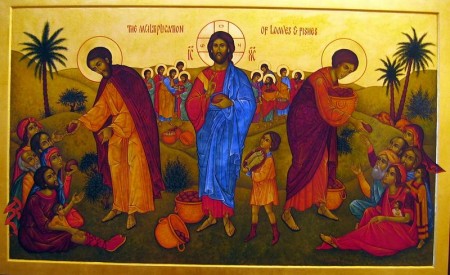 Jesus, when he preached to an unexpectedly large crowd, so large he had to climb into a boat and preach from the water in order to be heard, fed their hunger for God with stories and wisdom about the abundant presence of God. But their hunger was physical as well as spiritual, they were poor, and hunger went deep down to the bone in them and their stomachs growled. The pervasive sense of not-enough, of scarcity and grimness, was everywhere. The disciples saw it, felt it, and urged Jesus to send them away, for the hour was late, and these people needed to buy food.
Jesus, when he preached to an unexpectedly large crowd, so large he had to climb into a boat and preach from the water in order to be heard, fed their hunger for God with stories and wisdom about the abundant presence of God. But their hunger was physical as well as spiritual, they were poor, and hunger went deep down to the bone in them and their stomachs growled. The pervasive sense of not-enough, of scarcity and grimness, was everywhere. The disciples saw it, felt it, and urged Jesus to send them away, for the hour was late, and these people needed to buy food.
Jesus, who knew that the presence of God is rife with abundance and teeming with fruitfulness, said to the disciples, They don’t need to go anywhere. Bring what we have (five loaves and two fish) and offer it to them.
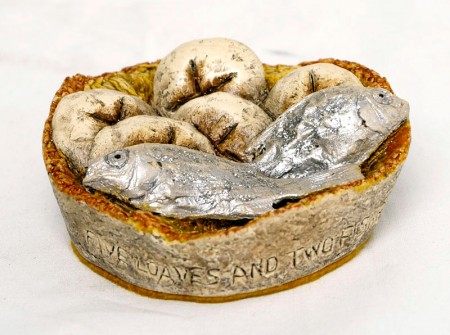 And incredulously, disbelieving, somewhat apologetic, they offered the not-enough that was theirs, and it was enough, in fact, it was more than enough. When everyone had been fed, there were twelve baskets leftover.
And incredulously, disbelieving, somewhat apologetic, they offered the not-enough that was theirs, and it was enough, in fact, it was more than enough. When everyone had been fed, there were twelve baskets leftover.
Small, memorable signs of great justice are part of the works of all of God’s prophets, and Jesus, who was a prophet and more than a prophet, made bread and wine, and bread and tears, bits of bread and broken fish, his small, memorable signs. Remember, say these signs, how incredulous with disbelief you were in a hungry time, and how you were filled.
Today is part of the festival of Ramadan for Muslims, a month in which they fast all day, then break their fast with dates and honey at 10 at night, then eat a full meal with neighbors and family. For a month, all the days and all work, are like this, panged with increasing hunger. And the nights, filled with the moon and stars, are filled with sweetness. Part of the ritual month is the giving of food and money for the feeding of the poor, whose hunger everyone is experiencing in Ramadan, for the love of God.
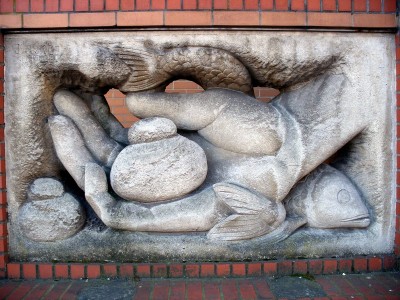 Orthodox Christians maintain the custom of fasting before receiving the Eucharist on Sundays, thereby experiencing some twinging of the stomach that is met by holy bread, so that their communion is more than gesture and words, but is sensed by the body as well.
Orthodox Christians maintain the custom of fasting before receiving the Eucharist on Sundays, thereby experiencing some twinging of the stomach that is met by holy bread, so that their communion is more than gesture and words, but is sensed by the body as well.
Years ago a German professor spoke to us one day about the hunger people knew at the end of WW2, when food was scarce in the final weeks of the war. He was 14 then, and he remembered receiving communion in the bomb damaged church in his village, how the Pastor had only part of a piece of bread, and meted it out in crumbs to them, how sweet it tasted on their hungry tongues and how unforgettable that ritual moment was in those days of utter defeat.
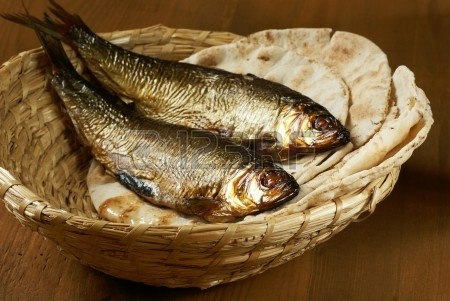 In the new Polish film Ida, a Jewish baby is saved by being given to a convent to raise, and she chooses to become a nun, but is required first to go and meet her one remaining relation, an aunt who is a lawyer and a judge and an atheist, after all that happened. The aunt, quite broken in spirit and a heavy drinker, gives the young woman what memories she can, using alcohol to bear the pain, and reaching for the joy buried in the sorrow. Though there is an overwhelming sense of Nothing and No More, the two women experience a great abundance together in the days they share, and awaken in one another a love neither of them had wanted, and also the rich loss both of them bear.
In the new Polish film Ida, a Jewish baby is saved by being given to a convent to raise, and she chooses to become a nun, but is required first to go and meet her one remaining relation, an aunt who is a lawyer and a judge and an atheist, after all that happened. The aunt, quite broken in spirit and a heavy drinker, gives the young woman what memories she can, using alcohol to bear the pain, and reaching for the joy buried in the sorrow. Though there is an overwhelming sense of Nothing and No More, the two women experience a great abundance together in the days they share, and awaken in one another a love neither of them had wanted, and also the rich loss both of them bear.
We churchgoers are as hungry for signs of the presence of God as any of the crowds who came to Ezekiel or Elijah or Jesus. Food is not scarce here, yet we ache for holiness, and are incredulous about miracles, and about the earth as God’s. We have, like Ida, lost the part of ourselves and our history that links us to the sacred.
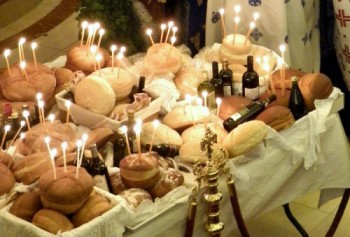 The regular practice of Sacrament, as an outward and visible sign of inward and spiritual grace, lacks the pang, punch, and palpable presence of God in our own lives, but only because we do not tell our own stories and our spiritual hungers as part of the ritual. Yet, the ritual holds a great truth, that we are fed as nourishment for hard times, filling us with the presence of God, whose abundance is without end. We are not, by this Sign, chosen for triumph, but for suffering and love. If we can taste abundance, then we will bend our hearts to feed the world’s hungers, here and everywhere.
The regular practice of Sacrament, as an outward and visible sign of inward and spiritual grace, lacks the pang, punch, and palpable presence of God in our own lives, but only because we do not tell our own stories and our spiritual hungers as part of the ritual. Yet, the ritual holds a great truth, that we are fed as nourishment for hard times, filling us with the presence of God, whose abundance is without end. We are not, by this Sign, chosen for triumph, but for suffering and love. If we can taste abundance, then we will bend our hearts to feed the world’s hungers, here and everywhere.
________________________________________________________
Illustrations:
1. Loaves and Fishes, Google Images.
2. Multiplication of Loaves, Contemporary Icon, Google Images.
3. Five Loaves and Two Fish, carving, Google Images.
4. Loaves and Fish, United Reformed Church, Brighton, Great Britain, Anders Sandberg photo, late 20th c. Vanderbilt Divinity School Library, Art in the Christian Tradition.
5. Pita Loaves and Fish. Google Images.
6. Breaking of Bread Service, Annunciation of St. Mary Greek Orthodox Cathedral, Toronto, Canada, 2014 photo. Vanderbilt Divinity School Library, Art in the Christian Tradition.


